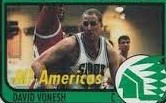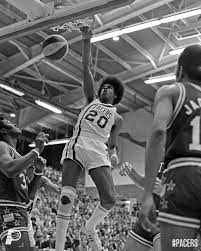Bob Hanson was the face of Omaha basketball during his quarter-century of service as head coach, and remains the winningest coach in program history despite retiring almost 3 decades ago. HoopsHD’s Jon Teitel got to chat with Bob about playing basketball at Wyoming and going to the Final 4 as a fan. Today marks the deadline for the Bob Hanson Family Maverick Basketball Scholarship (which supports student-athletes who have shown good academic success and demonstrated on/off-floor leadership during the previous academic year) so we take this time to remember Bob’s life/legacy.
You played basketball at Wyoming: how good a player were you back in the day, and how did you get into coaching? My wife and I went to a small school in Wyoming called LaGrange. It was a big day when Coach Bill Strannigan came to my hometown to sign me. I played well on the freshman team and toward the end of my sophomore year I scored 18 PTS in a game for the varsity, then became a 2-year captain. I was thinking of becoming an accountant but Bill suggested I try coaching instead. I coached the freshman team after I graduated, then coached a high school team for 1 year, and then came back to coach college kids. I later worked for Forddy Anderson, who became the only coach to lead his team to the NIT and NCAA in the same year. It was a start-up college but we had some great teams with several players who ended up playing pro basketball.
You made the NCAA D-2 tourney as coach at Omaha 7 times in a 10-year stretch from 1975-1984: how were you able to be so successful over such a long period of time? I had some good training and knew that I needed to get good players so I recruited well. It was a battle because we did not have dorms as a commuter school so it was hard to compete with other teams, but we tried to make it a strength (“you can live off campus!”). We got a lot of players from all over the Midwest but mostly Illinois/Nebraska.
In 1990 you got into a scuffle with North Dakota State coach Erv Inniger: how big a deal was it at the time, and are you surprised we do not see more disagreements these days? It was just a case where I congratulated him on the win in a derogatory way and he gave me a push and I took the charge! I looked over and all of my players were in a dogpile on the floor so I just walked off.
You spent 25 years with the Mavericks and remain the winningest coach in school history: do you think that anyone will ever break your record? I do not know, but what makes it easier now is that sometimes they play 38 or 39 games/year due to the existence of so many different tournaments. I worked for the NABC in New York City, which was a great experience. Some of the Summit League teams used to get 9000 fans/game, but now their numbers are down because the rivalries are not the same and you can watch so many great games on your TV from around the country.
What are your memories of the 1996 NCAA tourney as an assistant to Tom Asbury at Kansas State (Clayton Shields had 25 PTS/10 REB in a win by New Mexico)? 1 of our best players did not get to play in that game (Shawn Rhodes, who I had to take to the hospital before the game with a stomach ailment that might have required surgery), and I think his absence affected us greatly. We had a nice team that year and thought that we would go pretty far. We played Marshall 1 year when Billy Donovan was their coach: we pressed them and ended up winning.
You have attended almost every single Final 4 over the past half-century: what is your favorite Final 4 memory? I keep going and try to stay in touch with all my coaching friends and watch games every night. The 1st game my family went to was in Albuquerque and I thought that New Mexico State did not have a chance of winning…but they did. Villanova’s upset of Georgetown in the 1985 title game at Rupp Arena was pretty remarkable as well.
You worked for the Greater Wichita Area Sports Commission as president/CEO before retiring in 2020: how did you like the job, and what do you hope to do in the future? People told me that I should probably retire, as many of my former players have. I recently found out that 1 of my players had passed away but I tried to keep doing it as long as I can. It is hard to raise $1 million/year, but when we were able to build a new arena in Wichita it was a great accomplishment and I learned a lot. The question I got at every meeting was, “Can it be nice enough to host an NCAA tourney game”, and we have now done so a couple of times! The California Attorney General said their schools cannot travel here due to some religious laws, but we do not think it will end up affecting us.
When people look back on your career, how do you want to be remembered the most? I want them to feel that we had successful teams who played hard and had great character. I was fortunate to have players/coaches who went on to have further success and make more money than I did: it made me very proud. I have developed friendships all over the country which have been great for me and my family. We became friends with the Krzyzewski family: my wife wrote him a letter to congratulate him on winning the Olympics…and 3 days later she got a thank-you note in return, which was pretty impressive to us. My whole family joins me for trips to the Big 12 and NCAA tourneys so basketball will always be a part of our life. I go to a lot of college games during the year and enjoy seeing all of the nearby teams.







